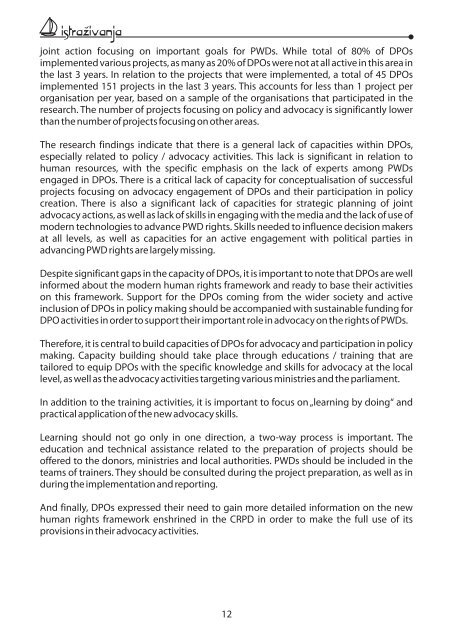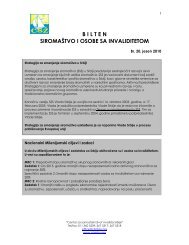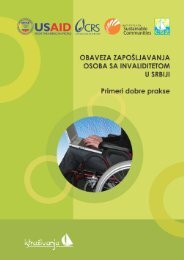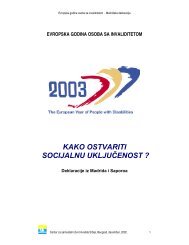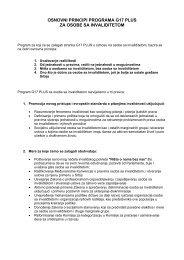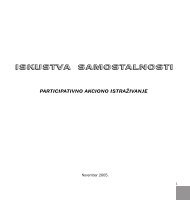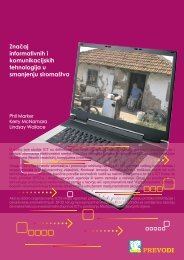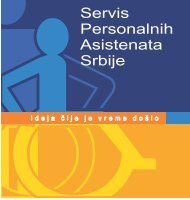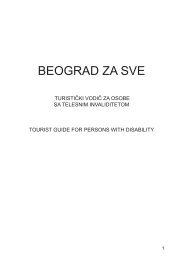RAZVOJ ZASTUPNIÈKIH KAPACITETA ORGANIZACIJA OSOBA SA INVALIDITETOM U SRBIJI
Preuzmite ovde - Centar za samostalni Život osoba sa invaliditetom ...
Preuzmite ovde - Centar za samostalni Život osoba sa invaliditetom ...
You also want an ePaper? Increase the reach of your titles
YUMPU automatically turns print PDFs into web optimized ePapers that Google loves.
istrazivanja<br />
joint action focusing on important goals for PWDs. While total of 80% of DPOs<br />
implemented various projects, as many as 20% of DPOs were not at all active in this area in<br />
the last 3 years. In relation to the projects that were implemented, a total of 45 DPOs<br />
implemented 151 projects in the last 3 years. This accounts for less than 1 project per<br />
organisation per year, based on a sample of the organisations that participated in the<br />
research. The number of projects focusing on policy and advocacy is significantly lower<br />
than the number of projects focusing on other areas.<br />
The research findings indicate that there is a general lack of capacities within DPOs,<br />
especially related to policy / advocacy activities. This lack is significant in relation to<br />
human resources, with the specific emphasis on the lack of experts among PWDs<br />
engaged in DPOs. There is a critical lack of capacity for conceptualisation of successful<br />
projects focusing on advocacy engagement of DPOs and their participation in policy<br />
creation. There is also a significant lack of capacities for strategic planning of joint<br />
advocacy actions, as well as lack of skills in engaging with the media and the lack of use of<br />
modern technologies to advance PWD rights. Skills needed to influence decision makers<br />
at all levels, as well as capacities for an active engagement with political parties in<br />
advancing PWD rights are largely missing.<br />
Despite significant gaps in the capacity of DPOs, it is important to note that DPOs are well<br />
informed about the modern human rights framework and ready to base their activities<br />
on this framework. Support for the DPOs coming from the wider society and active<br />
inclusion of DPOs in policy making should be accompanied with sustainable funding for<br />
DPO activities in order to support their important role in advocacy on the rights of PWDs.<br />
Therefore, it is central to build capacities of DPOs for advocacy and participation in policy<br />
making. Capacity building should take place through educations / training that are<br />
tailored to equip DPOs with the specific knowledge and skills for advocacy at the local<br />
level, as well as the advocacy activities targeting various ministries and the parliament.<br />
In addition to the training activities, it is important to focus on „learning by doing“ and<br />
practical application of the new advocacy skills.<br />
Learning should not go only in one direction, a two-way process is important. The<br />
education and technical assistance related to the preparation of projects should be<br />
offered to the donors, ministries and local authorities. PWDs should be included in the<br />
teams of trainers. They should be consulted during the project preparation, as well as in<br />
during the implementation and reporting.<br />
And finally, DPOs expressed their need to gain more detailed information on the new<br />
human rights framework enshrined in the CRPD in order to make the full use of its<br />
provisions in their advocacy activities.<br />
12


